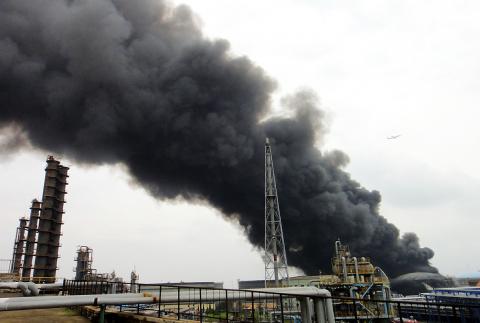A fire that broke out early yesterday at a PetroChina (中國石油天然氣) refinery in the northeastern Chinese city of Dalian, the second blaze in two months, was extinguished with no reports of injuries, the company said.
State-owned PetroChina, China’s biggest oil and gas producer, said the fire occurred in a diesel tank containing 725 tons of fuel at its subsidiary Dalian Petrochemical, but any that escaped had been channeled into an emergency storage pool.
The cause of the accident is under investigation, it said.

Photo: AFP
A fire in the middle of last month at the same refinery forced the company to suspend operations of some of its units.
Dalian was the site of China’s biggest known oil spill, when a pipeline explosion put at least 1,360 tonnes of oil into the sea in July last year.
The city recently saw protests by about 12,000 people demanding the removal of a chemical factory making paraxylene. In the face of such a rare, but bold show of public dissatisfaction, the authorities agreed to move the plant out of the downtown area.
The protest was mounted after waves from Tropical Storm Muifa last week broke a dike guarding the plant and raised fears that floodwaters could release toxic chemicals.
Recent oil spills in Bohai Bay, offshore from Dalian, have further raised concern over environmental risks from the region’s energy and chemicals industries, with government officials threatening legal action against ConocoPhillips China, which operates wells in the affected oil field with another big state energy company, CNOOC (中國海洋石油).
CNOOC’s refinery at Daya Bay, in Huizhou, halted operations in several of its production lines after a fire broke out in its aromatics unit on July 11.
PetroChina’s statements, posted on its Web site, emphasized that yesterday’s fire did not cause any pollution.
Dalian, a relatively well-planned, modern port city of more than 6 million, has found itself at the center of intensifying friction between economic planners counting on big industries such as petrochemicals to help power growth and residents desiring a healthy environment.
Downtown factories are a hot-button issue for educated Chinese and many cities, including Beijing and Shanghai, have closed down steel mills, shipyards and refineries and shifted them into the suburbs.
Petrochemicals already account for half of Dalian’s tax revenues, according to the city government, and city plans call for further expanding refineries into a regional oil products base.
The fires at the Dalian refinery have also raised concern about safety standards in the industry, as petrochemical companies struggle to preserve profit margins despite surging costs for crude oil and other raw materials.

Taiwanese suppliers to Taiwan Semiconductor Manufacturing Co. (TSMC, 台積電) are expected to follow the contract chipmaker’s step to invest in the US, but their relocation may be seven to eight years away, Minister of Economic Affairs J.W. Kuo (郭智輝) said yesterday. When asked by opposition Chinese Nationalist Party (KMT) Legislator Niu Hsu-ting (牛煦庭) in the legislature about growing concerns that TSMC’s huge investments in the US will prompt its suppliers to follow suit, Kuo said based on the chipmaker’s current limited production volume, it is unlikely to lead its supply chain to go there for now. “Unless TSMC completes its planned six

Intel Corp has named Tasha Chuang (莊蓓瑜) to lead Intel Taiwan in a bid to reinforce relations between the company and its Taiwanese partners. The appointment of Chuang as general manager for Intel Taiwan takes effect on Thursday, the firm said in a statement yesterday. Chuang is to lead her team in Taiwan to pursue product development and sales growth in an effort to reinforce the company’s ties with its partners and clients, Intel said. Chuang was previously in charge of managing Intel’s ties with leading Taiwanese PC brand Asustek Computer Inc (華碩), which included helping Asustek strengthen its global businesses, the company

Power supply and electronic components maker Delta Electronics Inc (台達電) yesterday said second-quarter revenue is expected to surpass the first quarter, which rose 30 percent year-on-year to NT$118.92 billion (US$3.71 billion). Revenue this quarter is likely to grow, as US clients have front-loaded orders ahead of US President Donald Trump’s planned tariffs on Taiwanese goods, Delta chairman Ping Cheng (鄭平) said at an earnings conference in Taipei, referring to the 90-day pause in tariff implementation Trump announced on April 9. While situations in the third and fourth quarters remain unclear, “We will not halt our long-term deployments and do not plan to

TikTok abounds with viral videos accusing prestigious brands of secretly manufacturing luxury goods in China so they can be sold at cut prices. However, while these “revelations” are spurious, behind them lurks a well-oiled machine for selling counterfeit goods that is making the most of the confusion surrounding trade tariffs. Chinese content creators who portray themselves as workers or subcontractors in the luxury goods business claim that Beijing has lifted confidentiality clauses on local subcontractors as a way to respond to the huge hike in customs duties imposed on China by US President Donald Trump. They say this Chinese decision, of which Agence